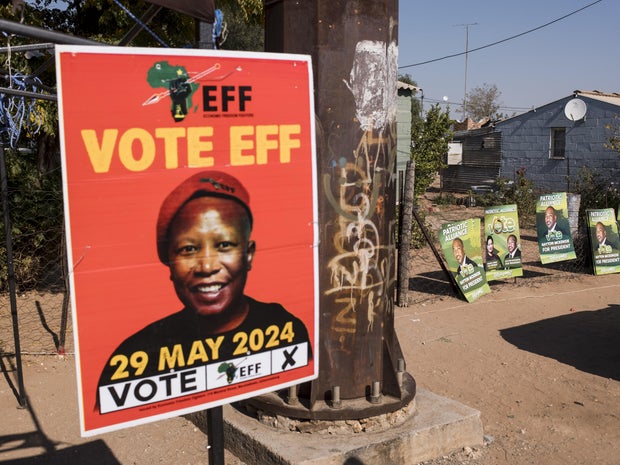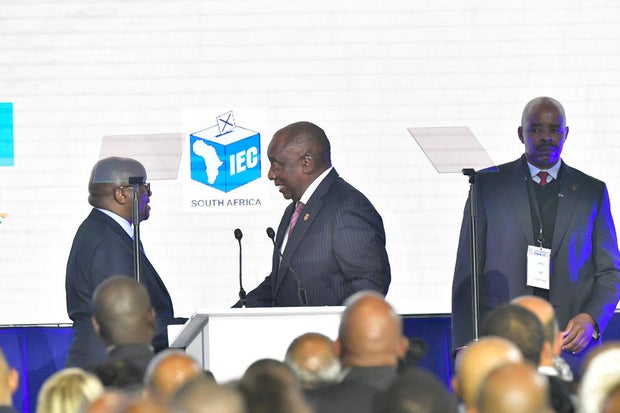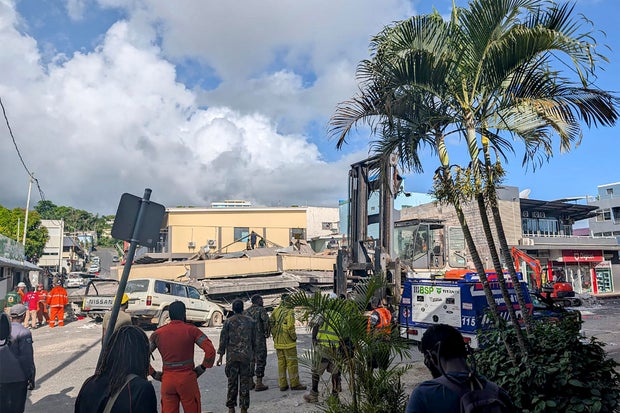CBS News
Why did Nelson Mandela’s ANC lose its majority in South Africa’s elections, and what comes next?

Johannesburg — On April 27, 1994, Black and White South Africans voted side by side for a new government for the first time in the country’s history. Nelson Mandela’s party, the African National Congress (ANC) had defeated apartheid and ushered in a new democratic era.
The ANC swept to power with ease and Mandela became South Africa’s first Black president to the delight of a mostly adoring country. Now, 30 years later, the party that brought democracy to South Africa has been defeated by it.
National election results announced over the weekend saw the ANC lose the electoral majority it had won in every round of voting since Mandela came to power on that historic day three decades ago.
Why did the ANC lose its long-held majority?
As they headed to the polls to cast their verdict on the ANC for the seventh time since 1994, South Africans had a lot to complain about.
RAJESH JANTILAL/AFP/Getty
A stubbornly high unemployment rate, which officially hit 32.9% last year but in reality is much higher; persistent economic inequalities; rampant corruption and a lack of public service delivery, particularly in poorer areas, all contributed to the dethroning of the ANC.
Then there were the frequent power cuts. Intermittent outages have been a near-constant for well over a year.
There’s also a soaring crime rate, with 130 murders and 80 rapes documented every single day in the last quarter of 2023.
Together, all these factors dented confidence in the long-ruling party, and the result was a slap in the face for the ANC, which garnered just 40.2 percent of the votes — well below the more than 50% needed to remain in power.
What comes next for South Africa?
Instead, the ANC has two weeks to negotiate a new power-sharing government with members of other parties. This could take the form of either a coalition with a smaller party, or a government of national unity, which would see multiple parties get roles in a unified cabinet.
The options available could not be more different.
The second largest share of the votes, 21.8%, went to the official opposition Democratic Alliance (DA), which has been on the political scene since the dawn of South Africa’s democracy and historically was a merger between the former apartheid rulers, the National Party, and liberal Whites who participated in the old apartheid regime but criticized the country’s racist policies.
The DA wants to liberalize the national economy, including a move toward greater privatization, but it is dogged by a credibility issue — perceived by many Black South Africans to be a mostly white, middle-class party that doesn’t care about the poor.
Then there’s the uMkhonto we Sizwe (MK) party, which exploded onto the political scene at the end of last year. It’s made up of former disgruntled ANC members and led by the disgraced former President of South Africa Jacob Zuma, who faces multiple corruption charges and was already sent to prison briefly in 2021 for defying a court order to testify at a corruption inquiry.
As a convicted felon, Zuma cannot run for office, but he remains the face of the party and helped MK snatch 14.9% of the vote away from the ANC by appealing to Zulu nationalism.
Like every election since democracy arrived in South Africa, this one has been declared objectively free and fair by observers. But that hasn’t stopped Zuma casting doubt on the results, including with public claims of vote-rigging, without providing any evidence.
On Sunday, the former leader issued an ominous warning.
“The results are not correct,” he said. “Results should not be declared. If you’re declaring, you’re provoking us. Don’t start trouble.”
MK’s manifesto is anti-constitutional. It speaks about nationalising the SA Reserve Bank and holding a referendum on scrapping the constitution completely.
The attacks on the election results appear aimed at denting the credibility of the vote and creating uncertainty. But Zuma is also fighting for his survival — desperate to avoid his corruption trial which could very well send him back to jail.
Lagging behind MK was another ANC breakaway party, the Economic Freedom Front (EFF), which argues that the ANC has not redressed the racial economic imbalances of apartheid. It wants to redistribute land to the less well-off and nationalise mines, banks and other key parts of the economy. But it made no gains in this election, instead dropping to 9.5% for a fourth place finish.
Jeremy Suyker/Bloomberg/Getty
The ANC could attempt to form a coalition with either the DA or the EFF and another smaller party, or even with MK, although it’s unlikely that Zuma would agree to this unless the ANC boots out its leader, incumbent South African President Cyril Ramaphosa, which seems just as unlikely, at least for now.
The unity option — a possible reset for South Africa?
As an alternative, a government of national unity would see a grand multi-party coalition, and possibly provide a reset for South Africa.
Despite this country’s multitude of problems and a poor voter turnout compared to previous years, democracy still holds strong in South Africa.
The election was mostly peaceful and South Africans actually sent a clear message by giving no single party a mandate to govern.
Gracious in defeat, Ramaphosa said the people’s will was clear, and he accepted the results.
“Our people have spoken, whether we like it or not,” said Ramaphosa. “Through their votes they have demonstrated clearly and plainly that our democracy is strong, that our democracy is robust and enduring.”
Sydney Seshibedi/Gallo Images/Getty
He said it seemed clear that South Africans want their leaders, from across the political spectrum, to find common ground and work together.
The cheerful goodwill could evaporate to some degree amid the cut and thrust of coalition-making, but the process has revealed a constitutional democracy that’s more robust than the chaos Zuma’s party seems to be hoping for.
The next 15 days will be crucial in shaping a government that serves the people of South Africa, and hopefully returns some trust in its political leaders.
CBS News
Earthquake rocks Pacific island nation of Vanuatu, deaths feared, U.S. embassy damaged
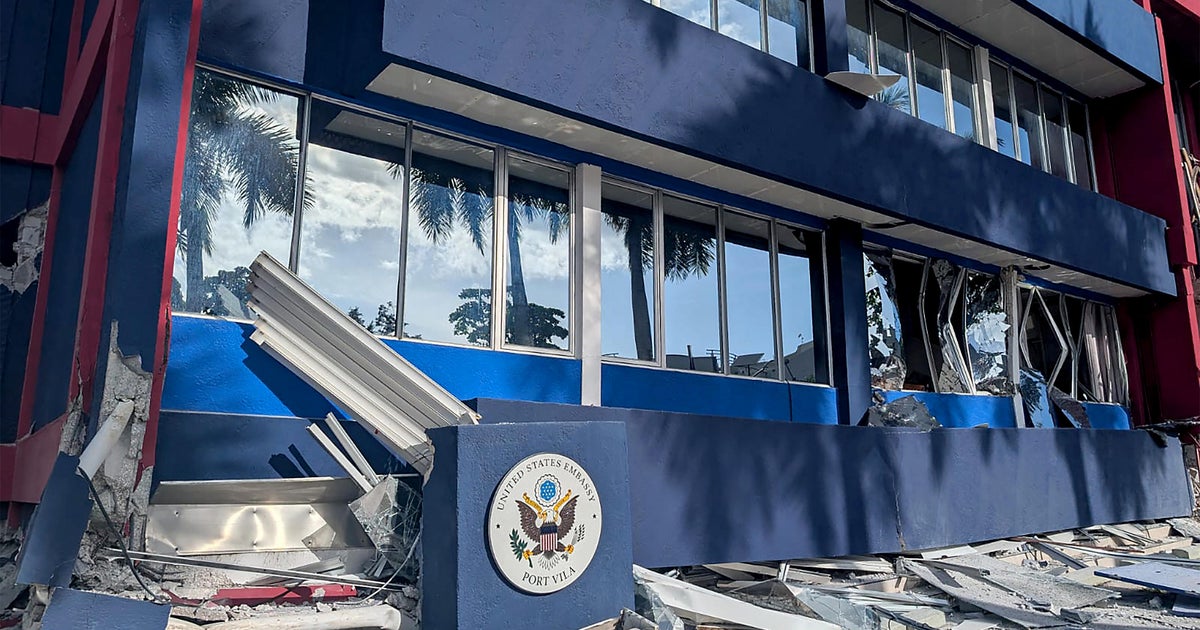
A powerful earthquake hit the Pacific island nation of Vanuatu Tuesday, smashing buildings in the capital, Port Vila, including one housing the embassies of the U.S. and other nations. A witness told Agence France-Presse of bodies seen in the city.
Dan McGarry, a journalist with the Organized Crime and Corruption Reporting Project based in Vanuatu, told the Reuters news agency in an interview that police said at least one person had been killed and injured people had been taken to hospital.
“It was the most violent earthquake I’ve experienced in my 21 years living in Vanuatu and in the Pacific Islands. I’ve seen a lot of large earthquakes, never one like this,” he said.
The 7.3-magnitude quake struck at a depth of 35 miles, off the coast of Efate, Vanuatu’s main island, at 12:47 p.m. local time, according to the U.S. Geological Survey.
The ground floor of a building housing the U.S, French and other embassies had been crushed under higher floors, resident Michael Thompson told AFP by satellite phone after posting images of the destruction on social media.
“That no longer exists. It is just completely flat. The top three floors are still holding but they have dropped,” Thompson said.
“If there was anyone in there at the time, then they’re gone.”
Thompson said the ground floor housed the U.S. embassy, but that couldn’t be immediately confirmed.
A photo showed significant damage to the building:
STR / AFP via Getty Images
The United States has closed the embassy until further notice, citing “considerable damage” to the mission, the U.S. embassy in Papua New Guinea said in a message on social media. “Our thoughts are with everyone affected by this earthquake,” the embassy said.
The New Zealand High Commission, housed in the same building, suffered “significant damage,” a statement from Foreign Minister Winston Peters’ office said, adding that, “New Zealand is deeply concerned about the significant earthquake in Vanuatu, and the damage it has caused.”
Thompson, who runs a zipline adventure business in Vanuatu, said, “There’s people in the buildings in town. There were bodies there when we walked past.”
A landslide on one road had covered a bus, he said, “so there’s obviously some deaths there.”
The quake also collapsed at least two bridges, and most mobile networks were cut off, Thompson said.
“They’re just cracking on with a rescue operation. The support we need from overseas is medical evacuation and skilled rescue, (the) kind(s) of people that can operate in earthquakes,” he said.
STR / AFP via Getty Images
Video footage posted by Thompson and verified by AFP showed uniformed rescuers and emergency vehicles working on a building where an external roof had collapsed onto a number of parked cars and trucks.
The streets of the city were strewn with broken glass and other debris from damaged buildings, the footage showed.
Nibhay Nand, a Sydney-based pharmacist with businesses across the South Pacific, said he had spoken to staff in Port Vila who said most of the store there had been “destroyed” and that other buildings nearby had “collapsed.”
“We are waiting for everyone to get online to know how devastating and traumatic this will be,” Nand told AFP.
A tsunami warning was issued after the quake, with waves of up to three feet forecast for some areas of Vanuatu, but it was soon lifted by the Pacific Tsunami Warning Center.
Earthquakes are common in Vanuatu, a low-lying archipelago of 320,000 people that straddles the seismic Ring of Fire, an arc of intense tectonic activity that stretches through Southeast Asia and across the Pacific Basin.
Vanuatu is ranked as one of the countries most susceptible to natural disasters such as earthquakes, storm damage, flooding and tsunamis, according to the annual World Risk Report.
CBS News
12/16: CBS Evening News – CBS News
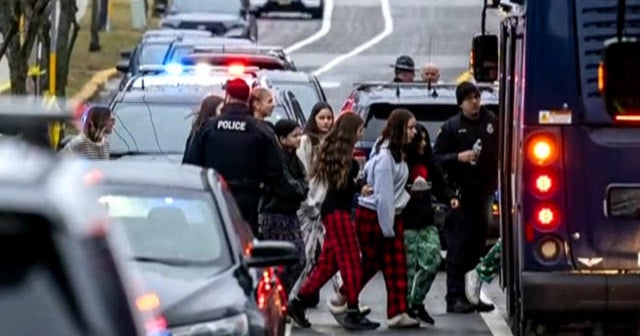
Watch CBS News
Be the first to know
Get browser notifications for breaking news, live events, and exclusive reporting.
CBS News
12/16: The Daily Report – CBS News

Watch CBS News
Be the first to know
Get browser notifications for breaking news, live events, and exclusive reporting.



